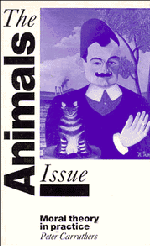Book contents
- Frontmatter
- Contents
- Preface
- 1 Moral argument and moral theory
- 2 Utilitarianism and contractualism
- 3 Utilitarianism and animal suffering
- 4 Utilitarianism and the harm of killing
- 5 Contractualism and animals
- 6 Animals and rational agency
- 7 Contractualism and character
- 8 Animals and conscious experience
- Conclusion
- Notes
- Index
5 - Contractualism and animals
Published online by Cambridge University Press: 03 May 2011
- Frontmatter
- Contents
- Preface
- 1 Moral argument and moral theory
- 2 Utilitarianism and contractualism
- 3 Utilitarianism and animal suffering
- 4 Utilitarianism and the harm of killing
- 5 Contractualism and animals
- 6 Animals and rational agency
- 7 Contractualism and character
- 8 Animals and conscious experience
- Conclusion
- Notes
- Index
Summary
In this chapter I shall consider what a contractualist should say about the moral standing of animals. Throughout, I shall make the simplifying assumption that no animals should be counted as rational agents, in the sense that is central to contractualism. The extent to which this assumption is true will be examined in the chapter that follows.
RAWLS'S CONTRACTUALISM AND ANIMALS
According to Rawls, we are to think of morality as the set of rules that would be agreed upon by rational agents choosing from behind a veil of ignorance. While these agents are supposed to have knowledge of all general truths of psychology, economics, and so on, they are to be ignorant of their own particular qualities (their intelligence, physical strength, projects, and desires), as well as the position they will occupy in the resulting society. Their choice of moral principles is to be made in the light of broadly self-interested desires (such as those for happiness, freedom, and power) that the agents know they will possess whatever particular desires and interests they subsequently come to have. Morality is here pictured as a system of rules to govern the interaction of rational agents within society. It therefore seems inevitable, on the face of it, that only rational agents will be assigned direct rights on this approach.
- Type
- Chapter
- Information
- The Animals IssueMoral Theory in Practice, pp. 98 - 121Publisher: Cambridge University PressPrint publication year: 1992
- 2
- Cited by



